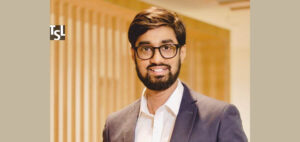The clean energy sector is at the head of the global effort to combat climate change, driving innovation in sustainability and decarbonization. This industry is generating renewable energy, optimizing energy efficiency, integrating smart grid technologies, and creating sustainable infrastructure. The transition to clean energy encompasses a wide range of activities, including the development of green buildings, smart cities, and sustainable transportation systems. The focus is on reducing carbon footprints, enhancing energy security, and nurturing economic growth through green technologies.
Nilesh Jadhav, currently the Head of Energy Performance and Sustainability Business at Siemens, has dedicated his career to advancing these goals. His journey includes significant roles in both academia and industry, where he has been influential in developing and implementing sustainability frameworks and innovative technologies. Nilesh’s leadership in sustainability is marked by his passion for environmental issues and his ability to translate technical expertise into practical, impactful solutions.
Let’s explore Nilesh’s journey from Petrochemicals to Sustainability:
Transitioning to Clean Energy
Nilesh pursued his Masters in Technological Design in the Netherlands and began his career in a petrochemical company as a Process Technologist, applying his knowledge. Many of the solutions he designed for process and energy efficiency improvements were implemented in the manufacturing plant. To gain a better understanding of the implemented solutions, he took up a role as Operations Manager at one of the company’s manufacturing sites in Singapore.
While working in Singapore, he completed his part-time MBA. This experience allowed him to view technology through a different lens, focusing on business practicality and financial viability. Armed with this new knowledge, he decided to leave his job in the petrochemicals industry and switch his career to clean energy and sustainability topics, which he is most passionate about.
After an attempt to start a solar energy solutions company, he joined a research institution at a premier University in Singapore. His intention was to delve deeper into the clean energy technology and sustainability space. His initial role at the institute was to support the development of technology primers and roadmaps on sustainability topics such as green buildings and smart grids for Singapore government agencies.
Subsequently, he took up a challenge to transform the University campus itself into one of the most sustainable campuses in the world through an initiative called ‘EcoCampus.’ This initiative was not only about greening the campus but also creating a framework for implementing the latest sustainability technologies through a ‘living lab’ concept on the University campus.
The living lab brought several industry partners and research teams together to develop and implement innovative technological solutions supporting the sustainability goal of the University, which is to achieve a 35% reduction in energy, water, and waste intensity for the entire campus (spanning 200 hectares).
His work at the University also led him to get involved in industry associations and further developmental work with government agencies. This provided a multi-faceted exposure to the sustainability topic from different angles and allowed him to network widely beyond his usual work path with large corporations, policymakers, and a diverse set of business leaders in general.
He left the University with a spin-off company that would commercialize one of the IPs developed through research at the University. This wide network and his years of diverse experience and work in the field of green technology helped him position himself for his current leadership position.
Self-Learning and Innovation
Nilesh has always been interested in technology, especially in how it benefits humanity. With climate change emerging as an existential threat to humanity, he decided to devote his life’s work to environmental sustainability over the past 15 years. This was a significant shift from the first decade of his work in the petrochemical industry.
He had to self-learn a lot of things, as the technologies in the domain of environmental sustainability are still evolving. For example, he self-learned a lot of concepts about Green Buildings while supporting the Singapore national roadmap development, and eventually, he gathered enough know-how to write a book on this topic.
His book titled ‘Green & Smart Buildings: Advanced Technology Options’ was published by Springer in 2018, and he is glad to know that it has benefited many people and is being used as a reference book by Universities around the world.
He gains inspiration from various technological developments happening around him, and his vision has evolved from just being curious about them to doing active research and development (R&D) and eventually focusing on implementing the technologies in real life.
He has learned that each phase of technological development has its own challenges and requires a different approach and methodology for success. Each phase also comes with a different set of stakeholders that need to be engaged, involved at different levels, and convinced to work together to achieve the objectives.
Harnessing Technology to Address Global Challenges
Nilesh’s key mantra is ‘technology for good.’ This has been his core principle. For him, ‘good’ also includes profitability and economic development, along with doing good for people and the environment. He has always been guided by this principle throughout the years of his work. He believes that technology can be used as a transforming force for some of the world’s most pressing challenges, such as climate change, food security, and social upliftment.
The United Nation’s 17 Sustainable Development Goals (SDGs) provide a comprehensive framework in this direction. He believes that technology for good must be nurtured,
developed, and applied in the right way to create positive impacts in the day-to-day lives of people.
A year ago, he joined Siemens, a company that has ‘technology to transform the everyday’ in its tagline. This is what attracted him to the company, and he discovered that they have good values for societal good and environmental protection ingrained in the company culture.
Creating a Culture of Innovation
The role of the leadership team, as Nilesh sees it, is to create an environment or culture of innovation. It’s all about supporting new ideas, encouraging experimentation, and fostering collaboration. To support new ideas, it’s important to first create channels where team members can freely share their ideas without fear of criticism and to ensure that leadership actively listens to employees’ feedback.
This could be done simply by allowing team members to speak up more during meetings and not being overly prescriptive in offering solutions as a team leader. Apart from this, it could be beneficial to provide collaborative tools like concept boards, shared files, and remote communication apps where team members can work together across different geographies and time zones. It’s also worthwhile to focus proactively on the personal development of staff by offering training programs to develop new skills and encourage continuous learning.
Networking and Partnerships
Nilesh approaches collaboration and partnerships proactively. He believes that a lot can be accomplished by reaching out to the right partners to work together. He makes it a point to keep in touch with like-minded industry leaders through chat groups and social media engagements.
He uses LinkedIn, where he has more than 7,000 followers, extensively for sharing ideas and sparking collaborative discussions. Another aspect of his approach is networking in the industry through industry associations and events. He has served on boards of prominent industry associations such as the Sustainable Energy Association of Singapore (SEAS) and the Singapore Green Building Council (SGBC). He is currently also the Chair of the Technical Committee on Energy under the Singapore Standards Council.
He understands that different stages of technological development require different partnerships to drive progress. For example, in the early stages, deep scientific expertise and access to laboratory experimentation are needed. In later stages, partnerships with willing customers or channel partners are required to pilot solutions and demonstrate proof of concept.
In the startup world, the concept of MVP (Minimum Viable Product) is often discussed, but it’s also applicable for established companies to maintain a fast pace of innovation. MVP allows for testing market acceptance and then guiding future technology development. Hence, it’s also important to collaborate with other technology partners who can provide MVP development.
The Role of Open Digital Platforms in Fostering Innovation
To inculcate a culture of innovation through ideas, it’s beneficial to create and encourage diversity of views by involving team members with different backgrounds, skills, and expertise. In his work, for example, Nilesh has often benefited by involving accountants and finance colleagues in discussions on projects, proposals, and reviews.
Diversity needs to start at the recruitment phase for new employees or when planning the recruitment of project team members for a new project. Putting in place diverse hiring and selection panels and carefully writing job descriptions to attract a diverse talent pool is also very important.
The future of tech needs to cater to a diverse set of market needs, and what has worked in the past may not be relevant anymore in the future. Bringing together people with diverse backgrounds, experiences, and perspectives can lead to unique solutions and groundbreaking ideas. Companies are also now catering to this need by creating open digital platforms that can accommodate a diverse set of solutions, business ideas, and applications.
For example, Siemens Xcelerator, launched a few years ago by Siemens, is an open digital business platform featuring a curated portfolio of IoT-enabled hardware and software, a powerful ecosystem of partners, and a marketplace. It is a business platform to facilitate interaction, foster innovation, and create value for all parties, viz., customers, partners, and developers. These kinds of technological solutions promise what is needed in today’s world: technology that is interoperable, easy to access, and easy to integrate.
Key Advice for Tech Leaders
Nilesh’s advice to tech leaders would be to be nimble, open to changes, and absolutely prioritize learning and development. It’s also important to be able to interpret market trends and have an entrepreneurial spirit to balance risk-taking with business continuity, growth, and profitability. To achieve this, it’s beneficial to read extensively, network widely, and be open to collaboration and partnerships.
At the same time, it’s important to celebrate achievements, publish learnings, and share insights and feedback through the most relevant channels. He has proactively joined technical committees at industry associations, volunteered time on advisory and governing boards, and chosen opportunities to do public presentations and join industry discussion panels.
He keeps learning and, at the same time, conducts teaching and lectures on topics that he is familiar with. He is an Adjunct Associate Professor at one of the top business schools in Singapore, and it gives him a great opportunity to meet and possibly work with a diverse set of talented executives who attend his courses.
Maintaining Work-Life Balance
Taking good, energizing breaks, having fun while working, and discussing work and life plans with near and dear ones as much as possible have helped Nilesh maintain a healthy work-life balance.
A Vision for Good
Nilesh’s goal is to make technology do good work in the marketplace, thus benefiting humanity and creating impact. He plans to contribute to the advancement of technology by making and keeping himself capable of doing the same through continuous learning, wide collaboration, and driving innovative thinking across the board.


